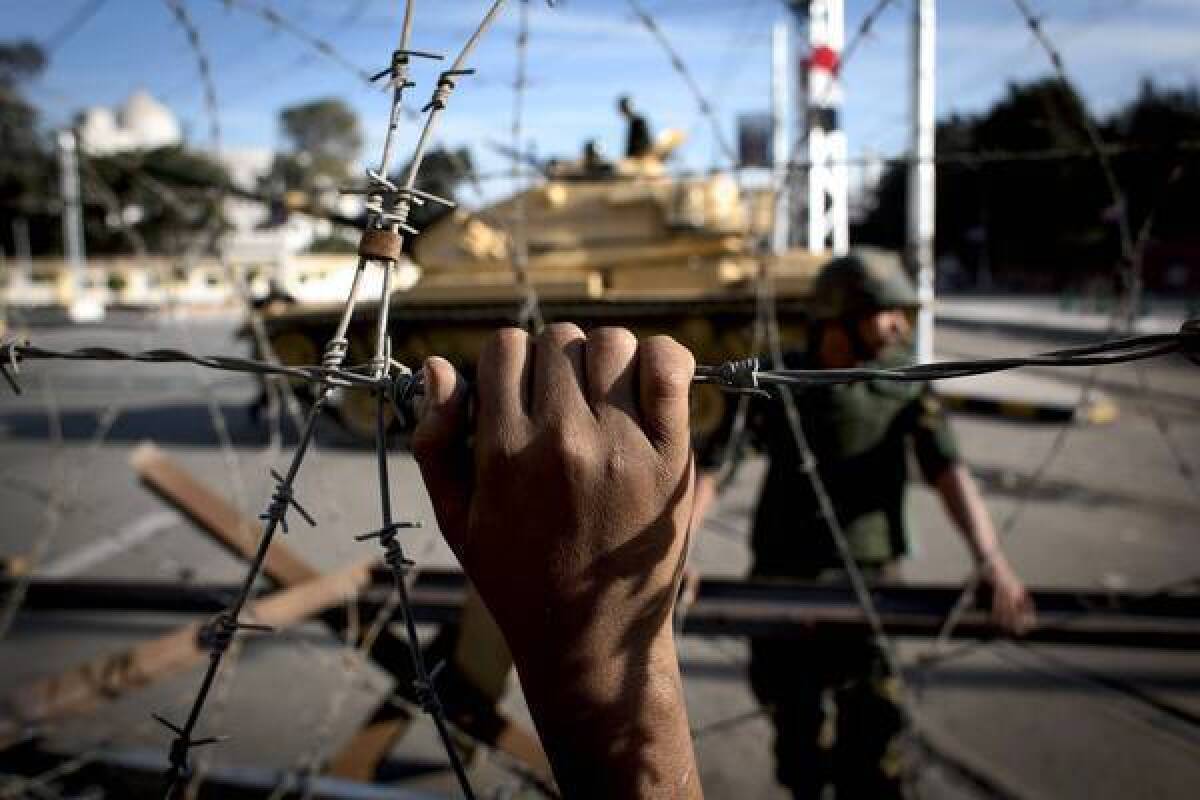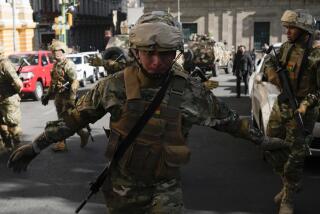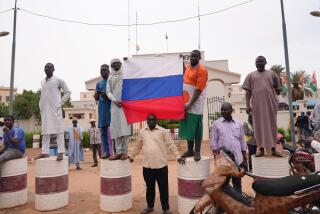Morsi refuses to cancel Egypt’s vote on constitution

- Share via
CAIRO — With tanks guarding his palace and officials defecting from his government, besieged Egyptian President Mohamed Morsi on Thursday offered a “national dialogue” with opposition leaders but refused to cancel a vote on a draft constitution that has ignited two weeks of political unrest.
In a televised address, Morsi was adamant that a proposed charter written by an Islamist-dominated assembly would go to a referendum on Dec. 15. He also kept in place an unpopular decree that expanded his powers, blaming recent protest violence on “infiltrators,” including those who this week attacked his motorcade.
Pressure around the president was growing. Hours before his speech, soldiers of the Republican Guard strung barbed wire and parked tanks outside his office. Six senior advisors and three other officials have resigned from his government. The country’s leading Islamic institution called on him to stem his powers. And protesters clamored from coastal cities to desert towns.
PHOTOS: Thousands protest outside Egypt’s presidential palace
The president’s comments often echoed those of his toppled predecessor, Hosni Mubarak. Morsi spoke of conspiracies against the state by unnamed actors and a “fifth column” out to disrupt the country’s political transition. He offered veiled references to plotting Mubarak-era judges and businessmen and said he issued his decree to “safeguard” Egypt from dangers “within and without.”
Morsi acknowledged that anger over his decree had “stirred up opposition, which was understandable.” He hinted that he might revise part of the declaration and that the full order would be voided after the referendum.
“But,” said Morsi, who planned to meet with the opposition Saturday, “those who brought arms and hired thugs to wreak havoc must be punished.”
At least six people have died and more than 700 have been injured in clashes that began Wednesday between Islamist supporters of Morsi and protesters from mainly secular opposition movements. The opposition has repeatedly said it will not engage in talks with Morsi until he rescinds his decree and postpones the constitutional referendum.
Acknowledging the national outrage and recent violence, Zaghloul Balshi, the official in charge of overseeing the referendum, resigned in protest. “I will not participate in a referendum that spilled Egyptian blood,” he told a television station.
The head of Egyptian state television and radio also quit, as did Rafik Habib, a Christian who resigned as an aide to Morsi and as vice president of the Muslim Brotherhood’s Freedom and Justice political party. Habib’s departure speaks to months of unease by Coptic Christians over the rising prominence of Islamists in Egypt’s government.
Morsi and his Muslim Brotherhood have refused to retreat and the opposition has promised fresh protests. Morsi has the political edge; the Brotherhood is expected to turn out enough voters to pass the referendum. But both the president and the opposition appear frustrated, unable to compromise, yet each lacking an inspiring political vision to calm the unrest that has gripped the nation since Mubarak was deposed nearly two years ago.
“We are facing two scenarios: civil war or another military takeover,” said protester Mohamed Fawzi. “Morsi and the Brotherhood have given us a worse dictatorship than Mubarak. They have a bad man’s dream for the country. The opposition is doing its best, but we don’t know what will come. Our opposition leaders are bad, full of self-interest.”
Such sentiments have left the Arab world’s most populous nation teetering from within. Tear gas, street chants, young men throwing rocks and bloodied faces seem as if lifted from Mubarak’s final days in office in February 2011. The white tents, banners, flags and scratchy-voiced activists in Tahrir Square are also reminiscent; even the weather carries a familiar sting of winter.
“We brought down Mubarak but then it all went black,” said Ahmed Sayed, a home delivery worker. “First the military came in, then we were divided by violence. We were unable to pick a true leader of the revolution. It was a lesson we had to learn. But I’m very upset. My country is falling apart.”
Sayed joined the Muslim Brotherhood’s Freedom and Justice Party, then headed by Morsi. But he said he was troubled by the Brotherhood’s authoritarian tendencies since Morsi took power in June. He said he had seen no discourse, no emergence of an inclusive democracy.
“I have no connection to them anymore,” he said. “They promised to be centrists but they are not.”
Doubts about the Brotherhood’s tactics were underscored Thursday when Al Azhar University, a revered learning institution for Sunni Islam, urged Morsi to rein in his powers and enter unconditional dialogue with the opposition forces. The call added new frustration for Morsi, because Islamists who wrote the proposed constitution included an article that requires lawmakers to consult Al Azhar on matters pertaining to Islamic law.
Morsi has said he needs expanded powers to stop Mubarak-era judges and other officials from disrupting the country’s political transition. The Brotherhood has often portrayed the protesters as leftists, secularists and thugs, brandings that imply that those against Morsi are not true Muslims. That has riled many in Cairo’s Tahrir Square, and a number of protesters interviewed made a point of saying they were good Muslims.
“The Brotherhood is dividing us and they talk of religion as if only they own it,” said Mahmoud Mohamed Jahin, a farmer protesting in Tahrir. “Morsi wants to be the king of Egypt and he wants the Brotherhood to be his princes.... But there is no one guaranteeing the people peace and prosperity. We are aware of this now and will not back down.”
With barricades, barbed wire and military vehicles surrounding it, the presidential palace on Thursday night looked similar to the way it did during last year’s uprising. Defying a curfew, hundreds of protesters marched toward the compound. The military, whose rule of the nation after Mubarak’s fall drew derision from many Egyptians, said it would protect the palace but not step in to the political crisis.
“The armed forces, and at the forefront of them the Republican Guard, will not be used as a tool to oppress the demonstrators,” Gen. Mohamed Zaki told the state news agency.
More to Read
Sign up for Essential California
The most important California stories and recommendations in your inbox every morning.
You may occasionally receive promotional content from the Los Angeles Times.














